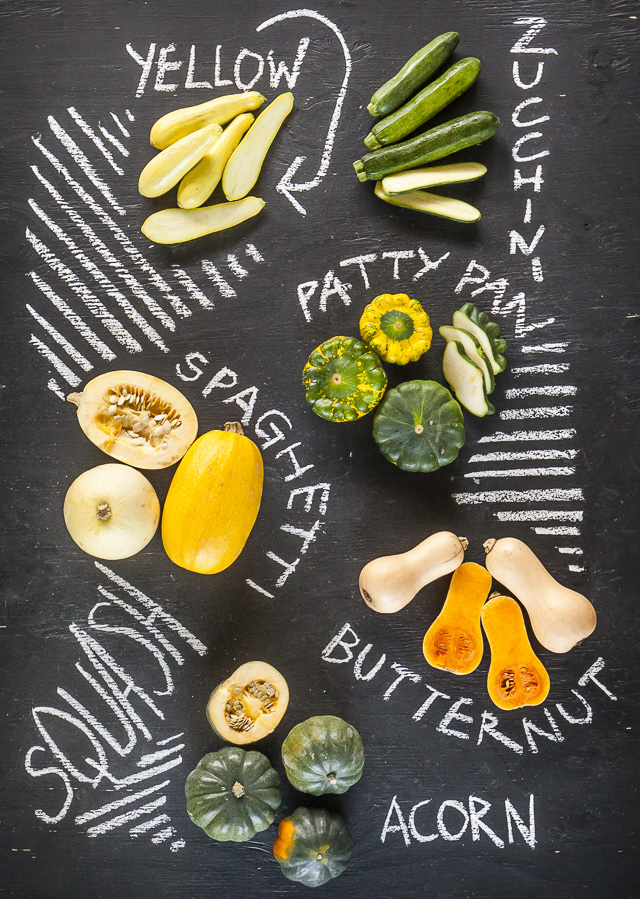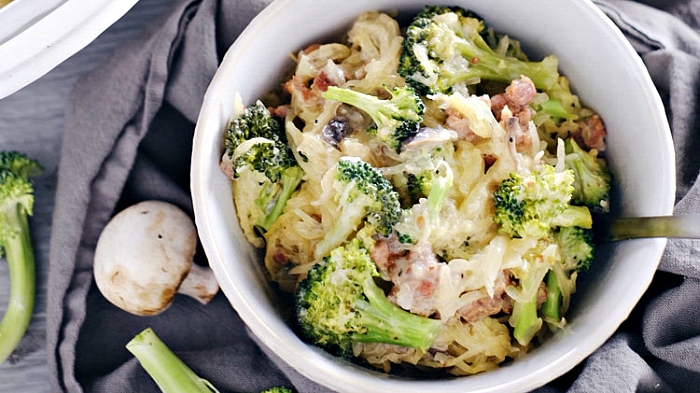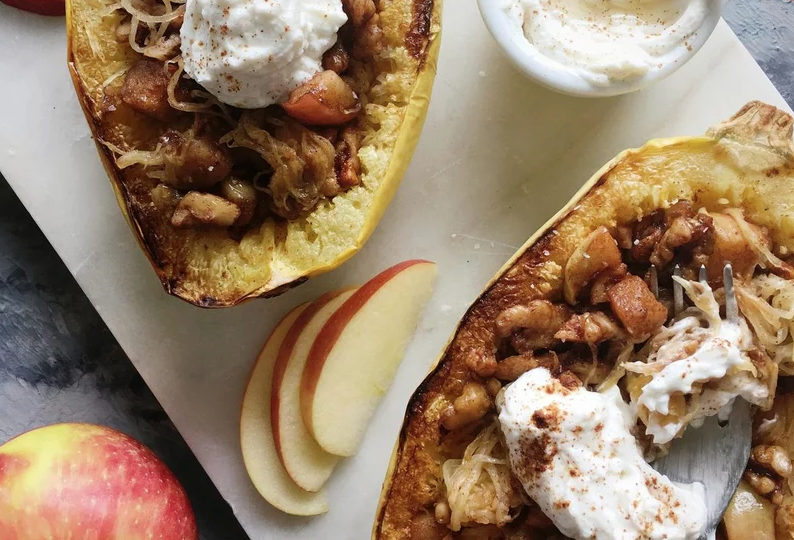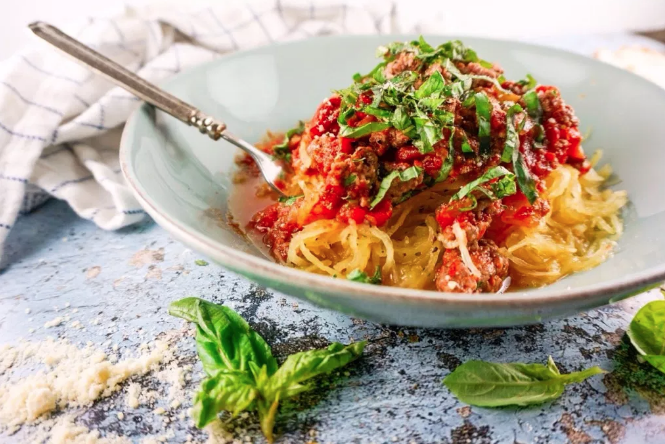
HOW TO SPAGHETTI SQUASH - RECIPES + FUN FACTS
07/13/18 — Heydon Hatcher
As spaghetti squash becomes more prevalent at the market stand, we thought we would highlight this versatile Cucurbitaceae family member, and briefly touch on some of its cousin squashes. This unique winter squash will be in season for a quick month, so get yours while you can!
 Spaghetti squashes. Photo by Scott David Gordon.
Spaghetti squashes. Photo by Scott David Gordon.
 Summer and winter squash rundown. Photo by Scott David Gordon.
Summer and winter squash rundown. Photo by Scott David Gordon.
 Spaghetti Squash Cake. Compliments of PCC Community Markets.
Spaghetti Squash Cake. Compliments of PCC Community Markets.
Spiced Spaghetti Squash Cake
Sweet Spaghetti Squash Muffins
Mock Coconut Pie with Spaghetti Squash
![]() Creamy Garlic S. Squash Casserole. Compliments of Further Food.
Creamy Garlic S. Squash Casserole. Compliments of Further Food.
Spaghetti Squash Pizza Crust
Creamy Garlic Spaghetti Squash Casserole
Low Carb/High Protein Spaghetti Squash Pancakes
![]() Dessert spaghetti squash. Compliments of Sara Tane.
Dessert spaghetti squash. Compliments of Sara Tane.
Sweet Spaghetti Squash Noodles with Toasted Pecan Crumble
Dessert Spaghetti Squash with Apples, Walnuts, Cinnamon, and Goat Cheese
![]() S. Squash Bolognese. Compliments of Love & Risotto.
S. Squash Bolognese. Compliments of Love & Risotto.
Spaghetti Squash Bolognese
Spaghetti Squash Pad Thai
Spaghetti Squash Carbonara
There are so many ways to use this squash... sweet and savory! Grab one this weekend and explore the many possibilities. Also, check out this Tom Sum recipe by our blogger, Nadia, using spaghetti squash as a substitute for green papaya. ‘Til next time!
 Spaghetti squashes. Photo by Scott David Gordon.
Spaghetti squashes. Photo by Scott David Gordon.
What’s the deal with “winter” squash in the summertime?
Well first off, when we are talking winter squash, we are talking about the more hardy, rigid-skinned gourds like spaghetti, butternut, acorn, and kabocha squashes. We grow winter squash in the summer here in Texas because we can, and in large part, because the bug/disease pressure is too much in the fall. We do have some of the squashes, like butternut in the wintertime. However, if you are looking for more squash variety in your wintertime Central Texas local diet, blanch and freeze it! These puppies have quite a long shelf life, they can be stored for months on your kitchen counter, waiting patiently to be utilized in a massive variety of plates. These guys also take their sweet time and ripen on the vine for up to 120 days. Whereas, summer squashes like yellow squash, green zucchini, and yellow patty pan are on the vine for a third to half that ripening time (40-60 days). Summer squash is also more tender, fragile, and needs to be kept chilled when stored (usually keeping for a week or two at most). Summer and winter squash rundown. Photo by Scott David Gordon.
Summer and winter squash rundown. Photo by Scott David Gordon.
Spaghetti Squash Lowdown
This squash usually has yellow to orange flesh with quite large seeds in the center of the fruit (squash is technically a fruit). They are chockful of folic acid, potassium, vitamin A, and beta-carotene. Fun fact: the more orange the flesh, the more carotene content! Spaghetti squash can be microwaved, boiled, steamed, or baked. When cooked, the flesh falls away in strands like spaghetti. Low in calories and carbs, but high in versatility, here are some ways to utilize your squash in a fun, new, unique way.Spaghetti Squash in Baking
From muffins to pie, this squash shines bright in a gamut of sweeter plates. Spaghetti Squash Cake. Compliments of PCC Community Markets.
Spaghetti Squash Cake. Compliments of PCC Community Markets.
Spiced Spaghetti Squash Cake
Sweet Spaghetti Squash Muffins
Mock Coconut Pie with Spaghetti Squash
Spaghetti Squash as Gluten-Free
The perfect gluten-free substitute for any plate that warrants more gluten-laden ingredients. Creamy Garlic S. Squash Casserole. Compliments of Further Food.
Creamy Garlic S. Squash Casserole. Compliments of Further Food.
Spaghetti Squash Pizza Crust
Creamy Garlic Spaghetti Squash Casserole
Low Carb/High Protein Spaghetti Squash Pancakes
Spaghetti Squash as Dessert
A healthier take on sweet treats. Dessert spaghetti squash. Compliments of Sara Tane.
Dessert spaghetti squash. Compliments of Sara Tane.
Sweet Spaghetti Squash Noodles with Toasted Pecan Crumble
Dessert Spaghetti Squash with Apples, Walnuts, Cinnamon, and Goat Cheese
Spaghetti Squash in Traditional Pasta/Noodle Dishes
The more traditional way to use this squash with some new ideas. S. Squash Bolognese. Compliments of Love & Risotto.
S. Squash Bolognese. Compliments of Love & Risotto.
Spaghetti Squash Bolognese
Spaghetti Squash Pad Thai
Spaghetti Squash Carbonara
There are so many ways to use this squash... sweet and savory! Grab one this weekend and explore the many possibilities. Also, check out this Tom Sum recipe by our blogger, Nadia, using spaghetti squash as a substitute for green papaya. ‘Til next time!






 0 ITEMS IN CART
0 ITEMS IN CART 

